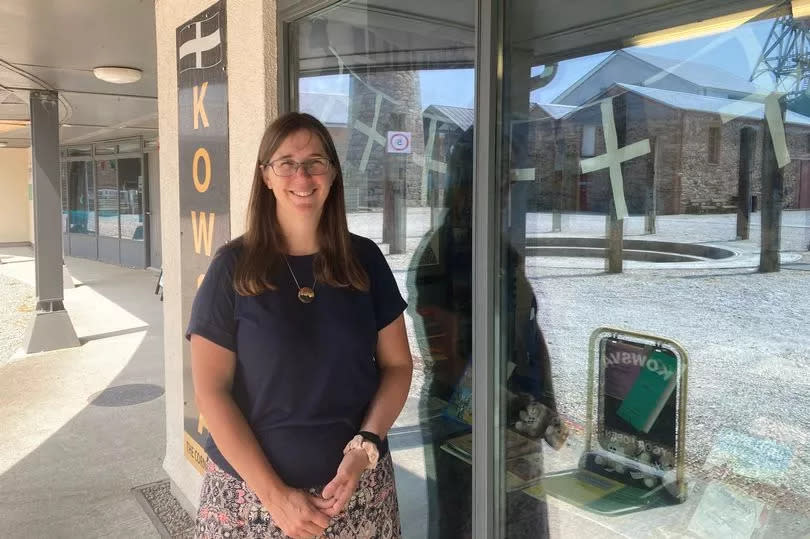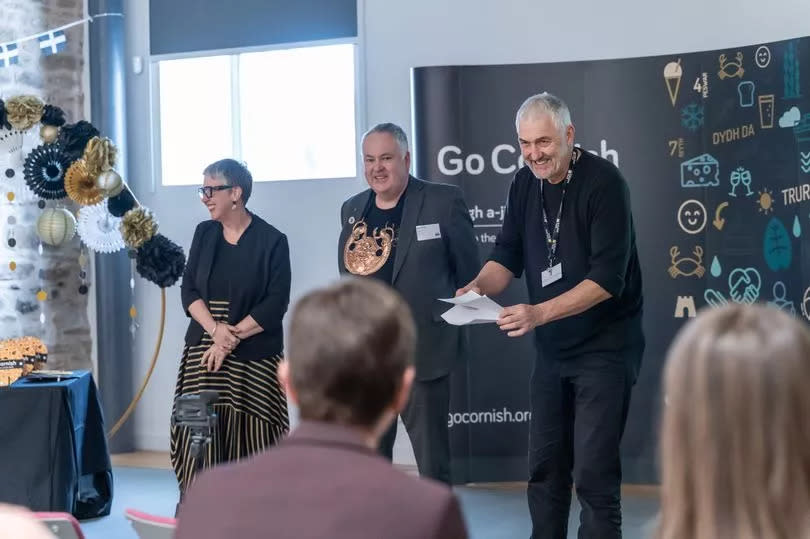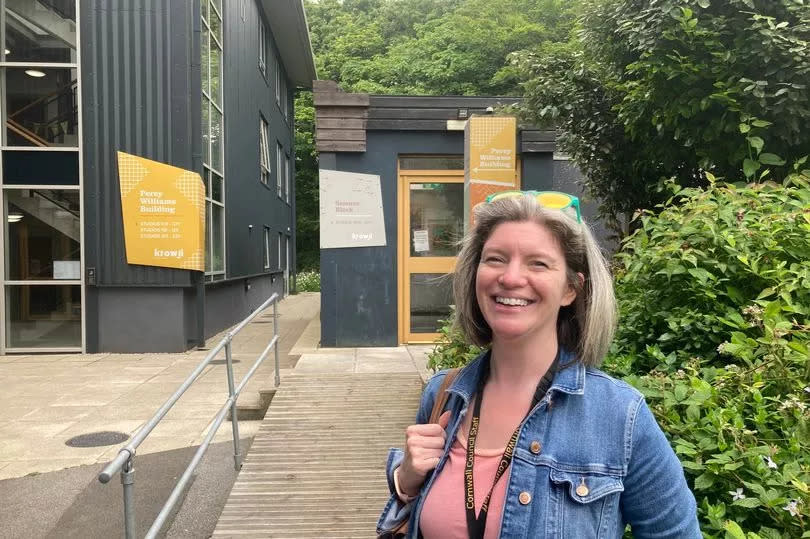The revival of Cornwall's native language and why more people are learning Kernewek

For many more Cornish people nowadays, learning Kernow’s official language is something they see as of great importance to their identity and heritage. This has sparked a revival of the ancient language as it is brought into the modern day.
Kernewek (or Cornish) was recognised by the UK Government under Part II of the European Charter for Regional and Minority Languages in 2002. The decision afforded the Cornish the same status as the Scottish, the Welsh and the Irish, and means that they have "the right to; express, preserve, share and develop their distinct culture and identity."
Then, in April 2014, the government formally recognised the distinct identity of the Cornish people by granting them minority status under the European Framework Convention for the Protection of National Minorities.
READ NEXT: Longest day celebrated at Cornwall's new summer solstice event
READ NEXT: LEGO fan builds cabin for collection after being served 'eviction notice' by his wife
The Cornish language has roots dating back at least 4,000 years but was declared as dying out by the 18th Century. “Fishwife” Dolly Pentreath, from Mousehole, has long been dubbed the last native Cornish speaker before the language all but disappeared after her death in 1777.
However, it began to see a revival of interest in the early 20th Century, when Cornish scholar, Henry Jenner, published A Handbook of the Cornish Language in 1904. Though the language remains niche, it’s seen another huge surge in support over the last 20 years, since being recognised as a minority language.
Emma Jenkin, the coordinator of Kowethas an Yeth Kernewek (The Cornish Language Fellowship) said she believes the catalyst for the sudden rise in the popularity of Cornish is the coronavirus pandemic, during which there was a spike in people who began learning the language online.
“Before the pandemic, I pretty much knew everyone who spoke Cornish,” she said. “Then the Cornish language community was forced to go online, so it opened it up more.
“People had more time to do things they wouldn’t have done before, and they started learning independently with resources they found on the internet. Then there became a positive feeling around it, so it spread.”
Cornish quickly gained popularity and it became more widespread as people turned to their roots to discover what it means to be Kernewek. “With everything being more globalised, having a link to your heritage creates a sense of belonging,” Emma explained.
“There are [Cornish language] classes in Australia, America, Mexico, and Japan. Cornwall’s mining heritage means that people have moved and spread all over the world, but they want to remain connected to their home in some way.”
Kowethas an Yeth runs weekly conversation groups, known as Yeth an Werin, for Cornish speakers across Cornwall. They also promote and foster the use of the language through a number of events held throughout the year, including the annual Speak Cornish Week, which is due to be held this year between June 22 and June 30.
There are now also over 6,000 pupils across 40 schools in Cornwall who are learning the language thanks to the Go Cornish scheme, an educational project providing Cornish language teaching programmes to primary schools.
Emma thinks the prospect of teaching Cornish to children in schools is encouraging. “It’s just so splann (great),” Emma said. “It’s so encouraging to carry on. If everyone wondered ‘what’s the point’, it’s not worth pushing forward but kids in schools are just so excited and enthusiastic to learn Cornish.
“It used to be retirees and amateur enthusiasts who were interested in learning the language, and that’s fine. But if you want it in all areas of society, kids need to be learning it too.”

However, Will Coleman the founder of Go Cornish, said it is both a positive and a negative that more people are wanting to learn the language in schools as demand is outstripping their capacity. Currently, there is only one school engagement officer for the whole of Cornwall, and she only works part-time, so Go Cornish has a dozen schools on a waiting list to join the scheme.
“We need more school engagement officers,” he explained. “The idea that a single school engagement officer can deal with schools from Torpoint, all the way to schools in Lands End and all the way up to schools near Bude, geographically it's just crazy.
“Where we have one school engagement officer who works part-time, we really ought to have about five. We’ve also got a small cohort of teachers now who really could do with some more intensive training in the language itself and increase their fluency because that would make a huge impact in schools.”
Will said there are a number of ambitions for the Go Cornish scheme, including expanding their reach to nurseries and secondary schools but this comes down to funding, which he said there currently isn’t enough of. Nonetheless, he believes: “Termyn ewn yw dh'omlowenhe gans Kernewek” (“the time is right to have fun with Cornish”).
His inspiration to set up the programme came from a linguistics expert at his school, who helped him learn Cornish during a lunchtime club. It was from there, Will’s interest in the language piqued and it allowed him to connect with both his home and cultural identity.
“When all the cool kids were out on the playground playing football, I was learning Cornish,” he laughed. “I’ve always been aware of it and that it’s something really special. It’s like a sleeping giant or an ungerminated seed which was just cooking away, waiting to bloom.
“Then I went on a school trip across the water to Brittany and I realised I could understand their place names too. As you start to go to other places, you realise how important this aspect of our cultural identity is and what a bonus it is for [Cornwall] to have such an underexploited treasure trove.”
In 2010, Unesco reclassified Cornish from "extinct" to "critically endangered", as the language spread from academia into mainstream education and use. The debate around whether the Cornish language was actually extinct is contentious, but many agree it has seen a revival, particularly in the last decade.

Jowdy Davey, Cornwall Council’s Cornish language lead, also believes that while there was a period when fewer people spoke Cornish, the language has always been around. “There’s some sensitivity around saying it died out because it survived in many ways, such as through place names,” she explained. “But as a community language, it has definitely seen a revival.
“It’s not a widely spoken language but the revival comes hand in hand with Cornish being recognised as a minority language in 2002 and as a minority identity in 2014.”
As part of her role, Jowdy aims to promote and help the spread of the language by looking at ways to encourage people to learn Cornish. One way she believes this can be achieved is through TV and music, as proved by the success of artists such as Mercury-nominated singer Gwenno, and comedian Kernow King, which has helped bring the Cornish language into the modern day.
“We believe that going digital is the way to move forward with the language,” she said. “We are also keen to promote Cornish through the cultural sector – for example, there are four Cornish language short films on BBC iPlayer and it’s being heard more in music thanks to artists like Gwenno.
“Being able to hear it and immerse yourself in the language through music or film is a good way to learn. It also helps normalise it and it piques interest when people can see Cornish being used around them. Even if you don’t know what the words mean, a lot of people become familiar with it through repetition.”
Click here to join CornwallLive on WhatsApp. We also treat our community members to special offers, promotions, and adverts from us and our partners. If you don’t like our community, you can check out any time you like. If you’re curious, you can read our Privacy Notice.
Dr Kensa Broadhurst from the University of Exeter's Institute of Cornish Studies said the uptake of the Cornish in recent years is positive. However, she believes there is still a need for greater protection of the language to help it spread further.
“People are notoriously bad at learning languages in England because, in the National Curriculum, it’s not compulsory to learn a language after the age of 14,” she said. “So, it’s great that people are wanting to learn Cornish, maybe even at a basic level.
“But there needs to be parity with other languages in the British Isles. It is the only Celtic language in the British Isles without the protection of part III of the European Charter for Regional or Minority Languages."
Dr Broadhurst believes that if it was given the same protection, it would help with getting funding so more people could learn the language. “Getting Cornish used more widely in schools comes down to funding and support for trained teachers,” she explained.
This is important, she said, because the language plays a key part in Cornwall’s rich identity and heritage. “People are more in touch with their cultural heritage and Cornish feeds into that and the feeling of being Cornish,” Dr Broadhurst explained. “But many people learning Cornish are not Cornish.
“Some perceive Cornwall as being a place where people wear dry robes and go surfing but it has a rich heritage, including being at the forefront of the industrial revolution, and that needs to be celebrated.”

 Yahoo News
Yahoo News 
